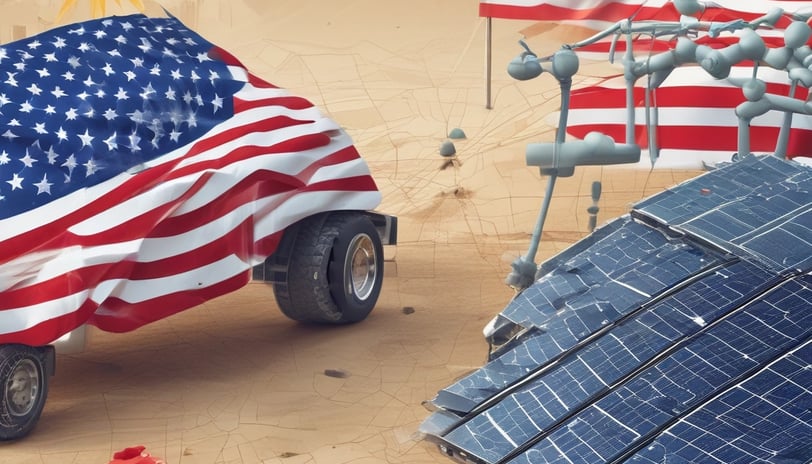"How China’s Export Curbs Are Rocking the US Clean Energy and Defense Sectors: What You Need to Know"
"China’s recent export controls on critical materials like gallium, germanium, and graphite are set to disrupt the US clean energy and defense sectors. Discover how these trade tensions could impact everything from solar power to electric vehicles, and what the future holds for US industries."
BLOG POSTEVS NEWS
evnovatech.com
12/23/20244 min read


US Clean Energy, Defense to be Impacted by China Export Curbs.
In a rapidly evolving global trade landscape, China has recently escalated tensions with the United States by imposing export controls on critical materials—gallium, germanium, and antimony—that are crucial to sectors ranging from clean energy to defense. The move is not just a reflection of mounting geopolitical rivalry, but also a stark reminder of how deeply interconnected global industries have become.
The Anatomy of China's Retaliation
In a surprise announcement, China revealed it would ban the export of gallium, germanium, and antimony to the US. These metals are not just industrial commodities; they’re the lifeblood of technologies that power everything from solar cells and semiconductors to electric vehicles (EVs) and advanced military equipment. The ban came just days after the US implemented its own set of restrictions, aiming to limit China’s access to cutting-edge semiconductor technologies.
The Chinese government has justified its export controls by citing national security concerns, but analysts and industry experts are quick to point out the far-reaching consequences these actions may have on US industries.
China is the world’s largest producer of these three metals, which are essential for the production of high-tech devices, electronics, and even military-grade technologies. The curbs have triggered a wave of uncertainty in key sectors of the US economy, particularly in clean energy and defense. With China in control of a significant portion of these critical materials, the repercussions could be severe for industries that rely on them.
The Domino Effect on US Clean Energy
One of the most immediate areas to feel the pressure is the US clean energy sector. Solar power, which has been experiencing rapid growth in the US, relies heavily on materials like gallium and germanium. These metals are integral in the production of efficient solar panels, and a disruption in their supply chain could significantly hamper the expansion of renewable energy in the country.
Additionally, graphite, which is used in the production of EV batteries, has also become a focal point of China’s export restrictions. The US has seen a sharp increase in electric vehicle adoption, but the ongoing trade disputes could drive up the costs of EV batteries or, worse, create bottlenecks in the supply chain.
For businesses and consumers alike, this could mean higher prices for solar energy systems and electric vehicles, two industries that have been driving forward the US’s push for energy independence and environmental sustainability.
Defense Sector: A Strategic Vulnerability
Beyond clean energy, the defense industry is another area where the impact could be more profound and far-reaching. Gallium and germanium are critical components in the production of advanced military technologies such as infrared sensors, satellite systems, and semiconductors for defense electronics. These materials are also used in cutting-edge communication and surveillance systems, essential for national security.
China’s restrictions could force the US military and defense contractors to seek alternative sources, which may not only be more expensive but also less reliable. The result could be delays in the development and production of critical defense technologies at a time when geopolitical tensions are running high.
Economic Uncertainty: A Growing Concern
While the export controls are still in their infancy, analysts are already warning of potential long-term consequences. Arun Seraphin, an expert at the National Defense Industrial Association, highlights that these restrictions could create significant uncertainty within supply chains. Companies in the clean energy and defense sectors rely on a predictable flow of materials to plan their production schedules. The new restrictions, however, could force many businesses to rethink their sourcing strategies, leading to increased costs and supply shortages.
In the short term, analysts believe the direct impact might be minimal. However, as the trade war between the two economic giants intensifies, the ripple effects could become more pronounced.
The Strategic Implications for US-China Relations
This move by China isn’t just about economics; it’s a calculated step in a larger geopolitical game. With both countries vying for dominance in technology, clean energy, and defense capabilities, every action taken—whether on trade or technology—adds another layer of tension to an already volatile relationship.
In the broader context, China’s export controls could signal the beginning of a new phase in the trade conflict between the US and China. As both nations impose increasingly stringent measures on each other, the global supply chain for critical materials could become fragmented, forcing companies to diversify their sources and rethink their strategies.
Looking Ahead: What’s Next?
As the dust settles from these new export controls, it will take time for the full effects on US industries to materialize. Companies in the clean energy and defense sectors will need to be agile and proactive in adapting to these changes. Some may find alternative sources for the materials they need, while others might face challenges in maintaining production levels or managing costs.
For the US government, these trade curbs are a stark reminder of how dependent its industries have become on foreign supplies of critical materials. As tensions escalate, the US may need to focus more on securing its own supply chains and reducing reliance on China for these essential resources.
FAQ Section
1. What materials are affected by China’s export restrictions? China has imposed export restrictions on gallium, germanium, antimony, and graphite. These materials are vital for the production of semiconductors, solar cells, electric vehicle batteries, and military technologies.
2. How do these restrictions impact the US clean energy sector? The US clean energy sector could face increased costs and supply chain disruptions due to China’s restrictions, particularly affecting the production of solar panels and electric vehicles, which rely on these critical materials.
3. What does this mean for US defense capabilities? The restrictions on gallium and germanium could impact the production of advanced military technologies, such as infrared sensors and satellite systems, potentially delaying defense projects and raising costs.
4. Will the US be able to find alternative sources for these materials? While it is possible that the US could diversify its supply chains, finding alternative sources for these materials could be challenging and more expensive, which may impact industries reliant on them.
5. What is the broader geopolitical context of these actions? China’s export restrictions are part of a wider trade and technological rivalry between the US and China. As both nations vie for global dominance in key sectors, such actions reflect the intensifying geopolitical tensions.
